Beekeeping in the United States has flourished as a practice that supports biodiversity, agriculture, and the economy. An effective beekeeping business plan is essential, guided by a comprehensive understanding of the varying state-specific beekeeping rules, securing a license, and obtaining the necessary permits and regulations. Different states have established distinct beekeeping laws, ensuring the bees and their habitats are protected and sustainably managed, adapting to the unique climates and types of bees in the United States.
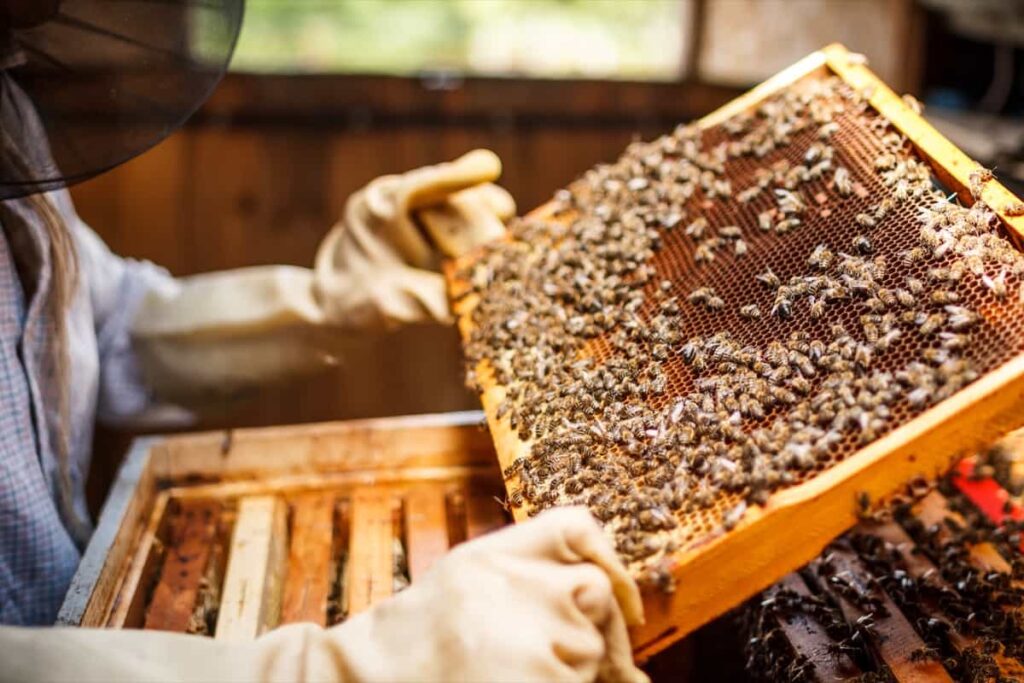
Importance of Beekeeping in the United States
Beekeeping in the United States holds immense significance, contributing to agriculture, economy, and biodiversity. It plays a vital role in pollination, helping cultivate various crops essential for food production, which benefits the agriculture sector immensely. Moreover, products like honey, beeswax, and propolis obtained through beekeeping contribute to the economy. Additionally, beekeeping supports biodiversity by maintaining healthy bee populations, which is essential for various ecosystems and helps sustain various types of bees in the United States.
Creating a Comprehensive Business Plan for Beekeeping in the United States
A well-structured business plan is essential for successful beekeeping in the United States. The plan should outline clear objectives, strategies, and financial projections for the beekeeping business. Key components should include market research, identification of target customers, a detailed plan for honey production and other by-products, and marketing strategies. The business plan should also be aligned with beekeeping rules, regulations, and laws to ensure that the business operates within the legal frameworks. Consideration of different types of bees and the environment is also necessary when formulating a plan.
Beekeeping Equipment and Tools Used in the United States
Various beekeeping tools and equipment are essential for managing and maintaining hives in beekeeping in the United States. Some common tools include hive tools, bee brushes, and smokers, which help handle bees and hive components. Beekeeping suits and gloves are also vital for protection during handling.
In case you missed it: 14 Steps to Start Beekeeping in Germany: Types of Bees, Business Plan, License, and Cost
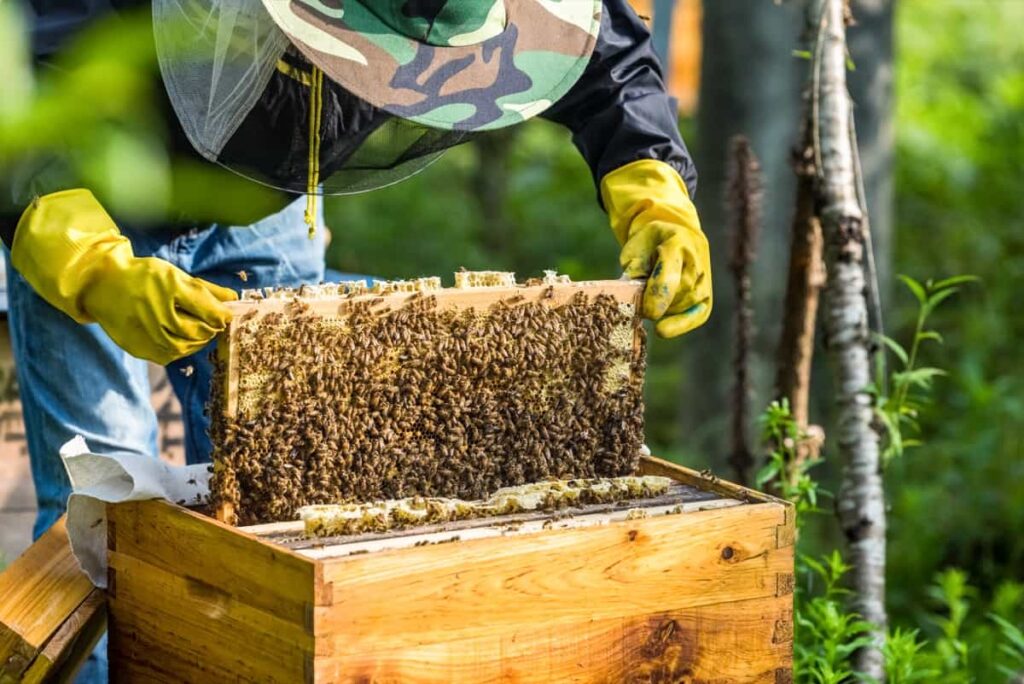
Additionally, essential equipment includes hives, frames, and foundations, which are necessary for housing bees and facilitating honey production. These tools and equipment are instrumental in successfully managing and operating beekeeping, ensuring that the beekeeper can effectively take care of different types of bees and hives used in the United States.
Types of Bees and Hives Used in American Beekeeping
In beekeeping in the United States, various types of bees and hives are utilized. Common bees include honey bees, bumblebees, and mason bees. Each bee type has specific roles and significance in pollination and honey production. Different hive types, such as Langstroth, top bar, and Warre hives, are also used, each having unique features and suitability for different bee species and beekeeping practices. Understanding the types of bees and the suitable hives is crucial for effective and sustainable beekeeping practices in the United States.
State-wise Beekeeping in the United States
How to Start Beekeeping in Alabama (AL): Regulations, Licensing, and Laws
Alabama emphasizes a clear set of beekeeping laws and regulations for those involved in the United States. Initiating a beekeeping business plan involves acquiring a license and apiary permits from the Department of Agriculture and Industries. These official documents ensure that beekeepers align their practices with Alabama’s laws and regulations, focusing on the health and sustainability of the types of bees in the United States found within the state.
How to Start Beekeeping in Alaska (AK): State Laws, Permits, and Regulations
Beekeeping in the United States, particularly in Alaska, demands a tailored approach due to the state’s unique climatic conditions. Beekeepers must secure the necessary permits, such as the apiary site registration and a beekeeping license from the Division of Environmental Health. The beekeeping laws and rules in Alaska ensure that beekeeping practices are conducted sustainably, respecting the state’s ecological diversity and the types of bees that inhabit the region.
In case you missed it: 15 Steps to Start Beekeeping in the Netherlands: Types of Bees and Honey Bee Farming Business Plan
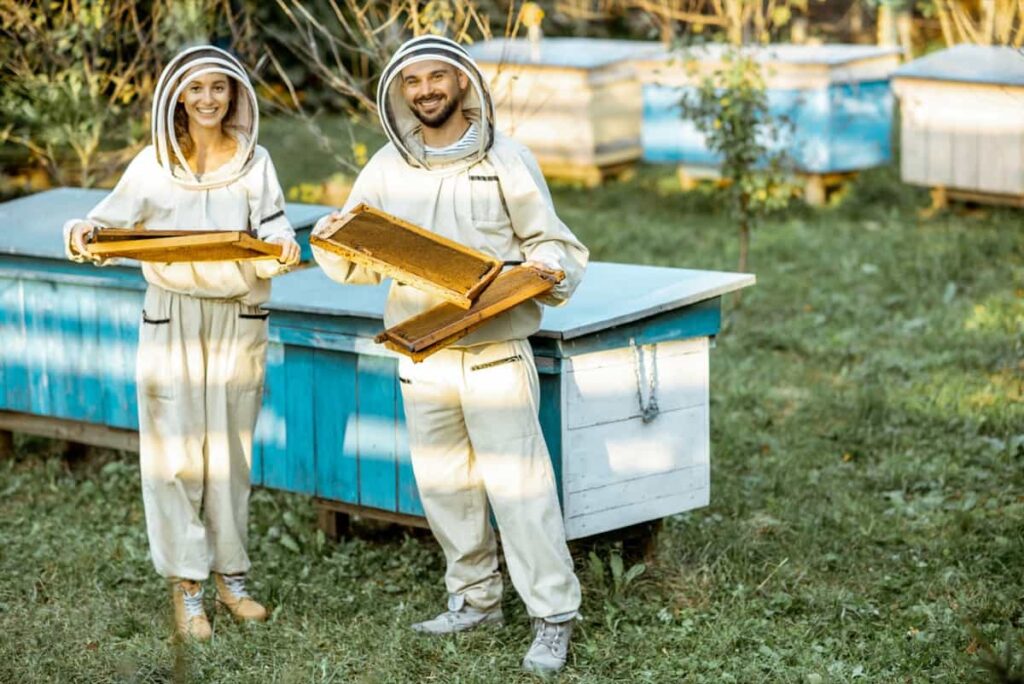
How to Start Beekeeping in Arizona (AZ): Licenses, Permits, and Regulations
In Arizona, beekeeping in the United States is governed by a set of beekeeping laws and rules. Prospective beekeepers must obtain a license and registration from the Arizona Department of Agriculture for apiary locations. Ensuring a well-rounded beekeeping business plan that includes these legal requirements is vital for the protection and management of different types of bees in the United States present in Arizona.
How to Start Beekeeping in Arkansas (AR): Licenses, Permits, and Regulations
Arkansas maintains specific beekeeping regulations, essential for beekeeping in the United States within the state. Beekeepers must secure the necessary permits and a beekeeping license from the Arkansas State Plant Board. These certifications are fundamental in legal beekeeping operations, ensuring that beekeepers comply with the state’s laws and regulations while fostering various types of bees.
How to Start Beekeeping in California (CA): Regulations, Licenses, and Permits
In California, individuals in the United States must follow stringent beekeeping laws and regulations. A proper beekeeping license, hive registration, and necessary permits from the California Department of Food and Agriculture are required. These legal prerequisites support a sustainable beekeeping business plan, safeguarding the types of bees prevalent in the state’s diverse climatic regions.
How to Start Beekeeping in Colorado (CO): Laws, Permits, and Regulations
Colorado has established beekeeping laws that govern beekeeping in the United States within the state. Obtaining necessary permits like location registration and a beekeeping license from the State’s Department of Agriculture is crucial. These regulations ensure that beekeeping practices preserve the health and diversity of the types of bees in the state in alignment with a structured beekeeping business plan.
How to Start Beekeeping in Connecticut (CT): Licenses, Permits, and Regulations
Connecticut’s laws for beekeeping in the United States necessitate securing essential permits such as apiary registration and a beekeeping license from the Department of Agriculture. Adherence to these beekeeping rules, coupled with a sound beekeeping business plan, promotes sustainable practices, taking into consideration the types of bees present in the United States and Connecticut’s ecosystem.
In case you missed it: Beekeeping Management Practices: Season-wise Management of Honey Bee
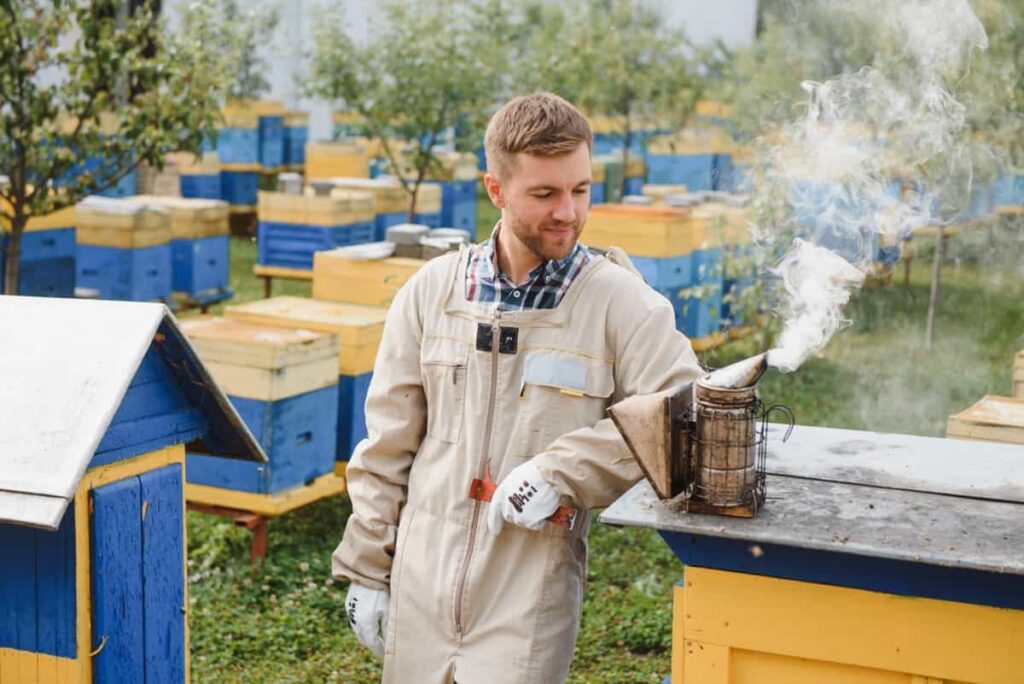
How to Start Beekeeping in Delaware (DE): Regulations, Licenses, and Permits
Adherence to state beekeeping laws and regulations is essential for beekeeping in the United States, specifically in Delaware. Beekeepers must obtain necessary permits, including hive inspections and a beekeeping license from the State’s Department of Agriculture. These legal procedures ensure the responsible management of the different types of bees and align with a well-organized beekeeping business plan.
How to Start Beekeeping in Florida (FL): Laws, Permits, and Regulations
Florida regulates beekeeping in the United States within its borders through defined beekeeping laws and rules. Necessary permits like apiary site approval and a beekeeping license from the Department of Agriculture and Consumer Services must be secured. These legal requirements, integrated into a beekeeping business plan, facilitate nurturing various types of bees in the United States within Florida’s warm environment.
How to Start Beekeeping in Georgia (GA): Licenses, Permits, and Regulations
Georgia’s approach to beekeeping in the United States involves clear laws and regulations. Beekeepers must obtain vital permits such as hive registration and a beekeeping license from the Georgia Department of Agriculture. A comprehensive beekeeping business plan should include these legal aspects, ensuring the conservation and proper management of the types of bees found within the state.
How to Start Beekeeping in Hawaii (HI): Regulations, Licenses, and Permits
In Hawaii, beekeeping in the United States is subject to island-specific beekeeping laws and regulations. Beekeepers must acquire essential permits from the Hawaii Department of Agriculture, including quarantine compliance and a beekeeping license. These formalities and a strategic beekeeping business plan support the sustainable management of diverse types of bees in the state’s tropical climate.
How to Start Beekeeping in Idaho (ID): Laws, Permits, and Regulations
Idaho’s beekeeping laws guide those involved in beekeeping in the United States within the state. The necessary permits, such as apiary registration and a beekeeping license, must be secured from the Idaho State Department of Agriculture. These regulations, integrated into a beekeeping business plan, ensure the thriving and protection of various types of bees in the United States residing in Idaho.
In case you missed it: Backyard Beekeeping Cost and Tips for Reducing Backyard Beekeeping Costs
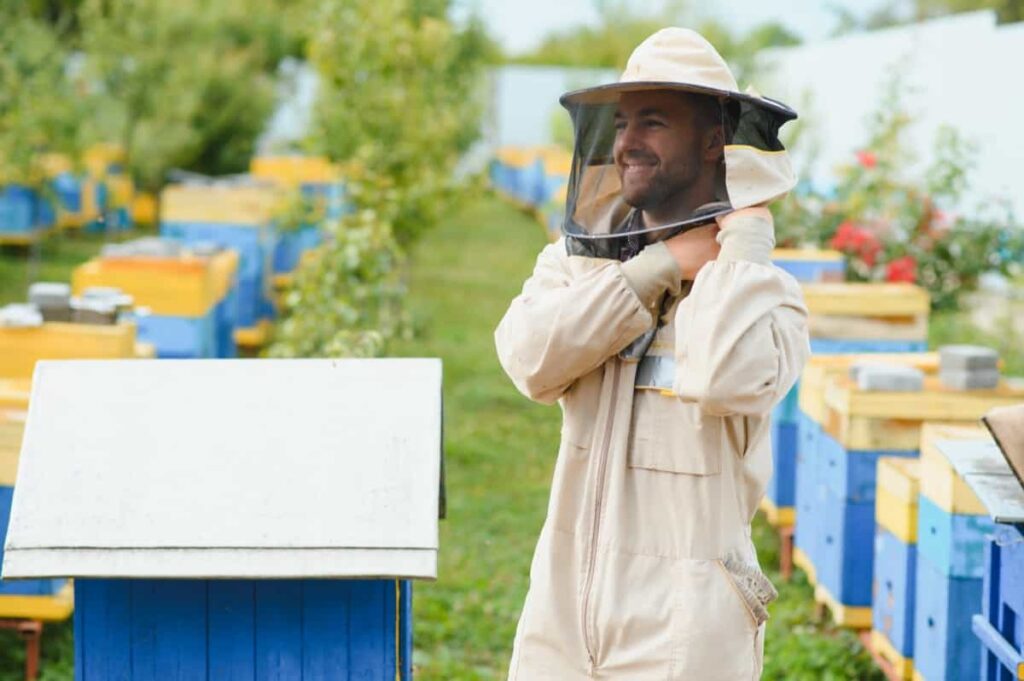
How to Start Beekeeping in Illinois (IL): Licenses, Permits, and Regulations
Illinois mandates specific regulations for beekeeping in the United States, including obtaining essential permits like apiary registration and a beekeeping license from the Department of Agriculture. Compliance with these beekeeping laws fosters a sustainable environment for the various types of bees in the state, aligned with a strategic beekeeping business plan.
How to Start Beekeeping in Indiana (IN): Regulations, Licenses, and Permits
Within Indiana, beekeeping in the United States is governed by state-specific beekeeping laws. Necessary permits, including apiary permits and a beekeeping license, are to be obtained from the Indiana State Entomologist. In conjunction with a practical beekeeping business plan, these legal steps ensure the well-being and sustainability of different types of bees in the state.
How to Start Beekeeping in Iowa (IA): Licenses, Permits, and Regulations
Iowa’s regulations for beekeeping in the United States include acquiring essential permits such as hive registration and a beekeeping license from the Department of Agriculture and Land Stewardship. Aligning with these beekeeping laws and a thoughtful beekeeping business plan supports the prosperous management of various types of bees in the United States present within Iowa’s diverse climates.
How to Start Beekeeping in Kansas (KS): Laws, Permits, and Regulations
In Kansas, beekeeping in the United States is governed by specific beekeeping laws. Beekeepers need to obtain the required permits and a beekeeping license from the Kansas Department of Agriculture. These credentials, paired with a sound beekeeping business plan, ensure that beekeeping aligns with state guidelines, ensuring the well-being of various bee species in the state.
How to Start Beekeeping in Kentucky (KY): Licenses, Permits, and Regulations
Kentucky’s regulations for beekeeping in the United States necessitate obtaining a license and additional permits, such as apiary registration, from the Kentucky Department of Agriculture. These permits ensure beekeepers comply with the state’s beekeeping rules and support the health of different bee types in Kentucky.
How to Start Beekeeping in Louisiana (LA): Regulations, Licenses, and Permits
In Louisiana, individuals aiming for beekeeping in the United States must secure a license and associated permits from the Louisiana Department of Agriculture and Forestry. These regulations help maintain the health of the various bee species in the state and ensure sustainable beekeeping practices.
In case you missed it: 11 Best Beekeeping Suits for Men and Women: Prices Included for Beekeepers in the USA
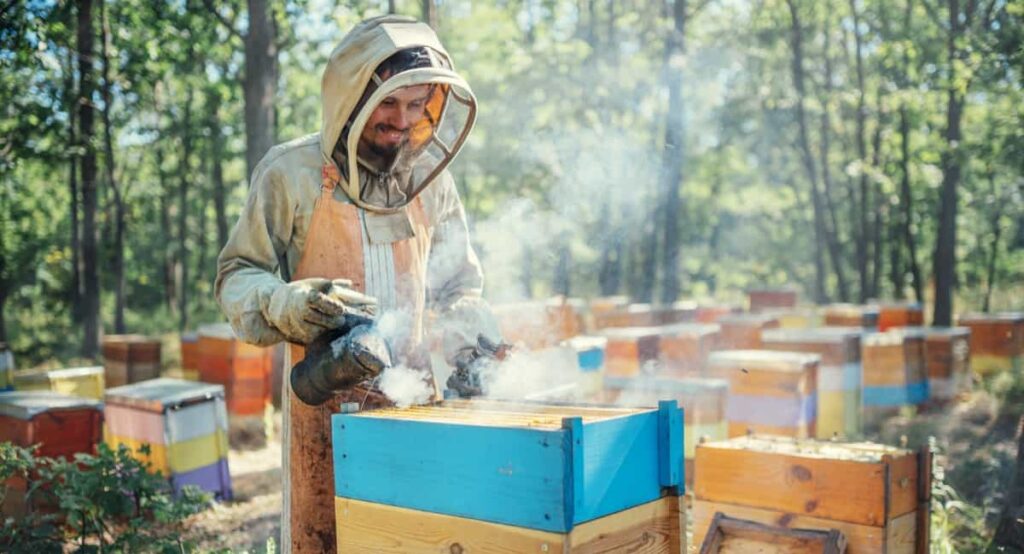
How to Start Beekeeping in Maine (ME): Licenses, Permits, and Regulations
Maine’s approach to beekeeping in the United States requires beekeepers to secure a license and necessary permits from the Maine Department of Agriculture, Conservation, and Forestry, including apiary registration. These regulations are in place to ensure the various types of bees in Maine are protected and maintained.
How to Start Beekeeping in Maryland (MD): Regulations, Licenses, and Permits
Maryland mandates that anyone interested in beekeeping in the United States within its borders obtain a beekeeping license and specific permits, such as hive registration, from the Maryland Department of Agriculture. These credentials, integrated into a beekeeping business plan, promote the health and diversity of bee species in the state.
How to Start Beekeeping in Massachusetts (MA): Licenses, Permits, and Regulations
Massachusetts’ beekeeping laws for those interested in beekeeping in the United States emphasize the need for a license and permits like apiary registration from the Massachusetts Department of Agricultural Resources. These rules ensure that beekeeping practices support the health and well-being of the various bee species.
How to Start Beekeeping in Michigan (MI): Laws, Permits, and Regulations
In Michigan, beekeeping in the United States requires securing a license and associated permits from the Michigan Department of Agriculture and Rural Development. These regulations and permits ensure that the different bee species in the state are nurtured and sustained in a controlled environment.
How to Start Beekeeping in Minnesota (MN): Licenses, Permits, and Regulations
For beekeeping in the United States within Minnesota, beekeepers must obtain the essential beekeeping license and permits like apiary site registration from the Minnesota Department of Agriculture. Following these regulations helps protect the various types of bees in the state and ensures responsible beekeeping practices.
In case you missed it: Honeybee Farming Operations Management: Month-Wise Beekeeping Maintenance for Better Profits
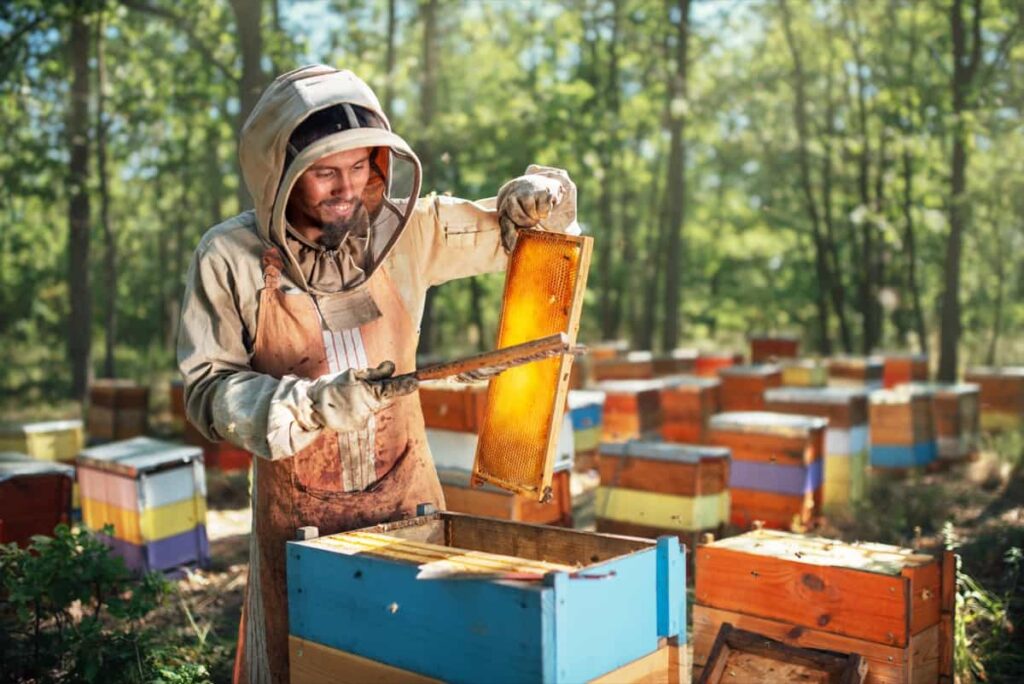
How to Start Beekeeping in Mississippi (MS): Regulations, Licenses, and Permits
Mississippi’s beekeeping laws require individuals to secure a license and associated permits in the United States within its borders. The Mississippi Department of Agriculture and Commerce oversees these regulations, ensuring the diverse bee species in the state are maintained healthily.
How to Start Beekeeping in Missouri (MO): Licenses, Permits, and Regulations
In Missouri, those engaged in the United States must obtain a beekeeping license and necessary permits like hive registration from the Missouri Department of Agriculture. These legal requirements and a strategic beekeeping business plan support the sustainable management of different bee species in the state.
How to Start Beekeeping in Montana (MT): Laws, Permits, and Regulations
For Montana, beekeeping in the United States mandates obtaining a license and required permits from the Montana Department of Agriculture. These regulations support sustainable beekeeping practices and ensure the health of the various bee species present in Montana.
How to Start Beekeeping in Nebraska (NE): Licenses, Permits, and Regulations
Nebraska’s beekeeping regulations for beekeeping in the United States necessitate obtaining a license and permits from the Nebraska Department of Agriculture, such as apiary registration. Adhering to these rules ensures the state’s protection and sustainable management of different bee species.
How to Start Beekeeping in Nevada (NV): Regulations, Licenses, and Permits
In Nevada, those aiming for beekeeping in the United States must secure the essential beekeeping license and required permits from the Nevada Department of Agriculture. These regulations and permits promote the health and diversity of various bee species in Nevada.
How to Start Beekeeping in New Hampshire (NH): Licenses, Permits, and Regulations
Acquiring a beekeeping license and necessary permits from the New Hampshire Department of Agriculture, Markets, and Food is vital for beekeeping in the United States within New Hampshire. These regulations help ensure the health and well-being of the different bee species in the state.
How to Start Beekeeping in New Jersey (NJ): Regulations, Licenses, and Permits
New Jersey’s beekeeping regulations require securing a beekeeping license and other essential permits for anyone interested in beekeeping in the United States within the state. The New Jersey Department of Agriculture oversees these regulations, ensuring the diverse bee species in the state are nurtured and protected.
In case you missed it: 10 Best Harvesting Machines in the USA for Small-Scale and Large-Scale Farms: Prices Included
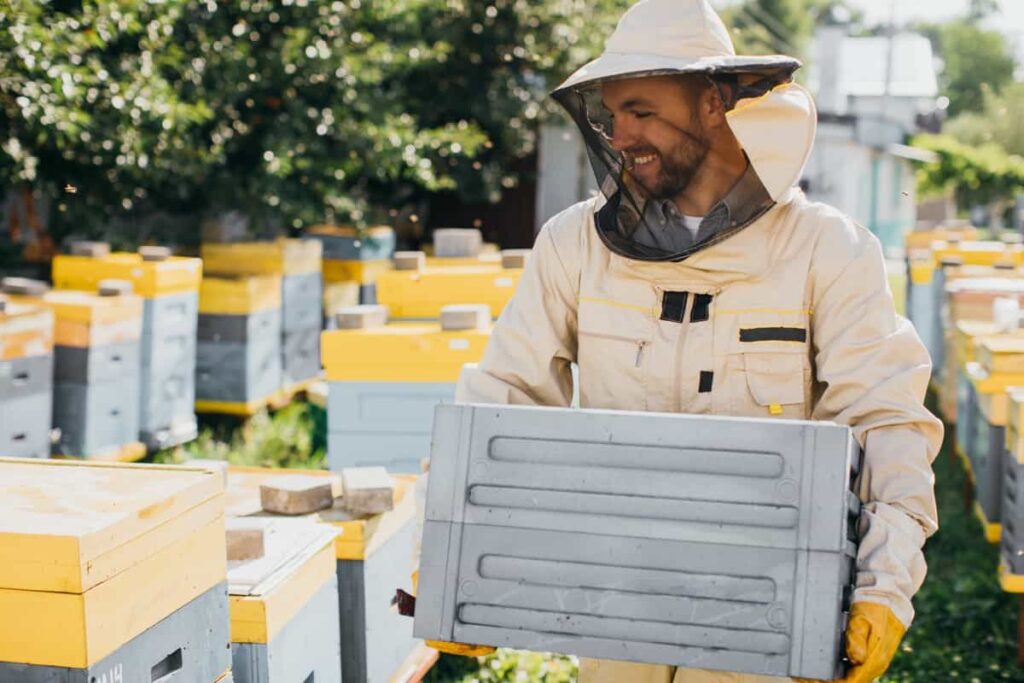
How to Start Beekeeping in New Mexico (NM): Licenses, Permits, and Regulations
In New Mexico, beekeeping in the United States necessitates obtaining a license and the required permits from the New Mexico Department of Agriculture. These regulations help conserve and sustainably manage various bee species in the state.
How to Start Beekeeping in New York (NY): Laws, Permits, and Regulations
For those interested in beekeeping in the United States within New York, obtaining a beekeeping license and essential permits, like hive registration, from the New York State Department of Agriculture and Markets is crucial. These regulations ensure the health and diversity of different bee species in New York.
How to Start Beekeeping in North Carolina (NC): Licenses, Permits, and Regulations
North Carolina’s laws for beekeeping in the United States emphasize acquiring a license and associated permits from the North Carolina Department of Agriculture and Consumer Services. These regulations ensure that beekeeping practices are sustainable and support the state’s health of various bee species.
How to Start Beekeeping in North Dakota (ND): Regulations, Licenses, and Permits
In North Dakota, individuals aiming for beekeeping in the United States must secure the North Dakota Department of Agriculture license and permits. These regulations are in place to ensure the conservation and health of different bee species in the state.
How to Start Beekeeping in Ohio (OH): Licenses, Permits, and Regulations
Ohio’s approach to beekeeping in the United States involves obtaining a license and required permits from the Ohio Department of Agriculture. Adherence to these regulations ensures that Ohio’s various types of bees are protected and their habitats are sustainably managed.
How to Start Beekeeping in Oklahoma (OK): Laws, Permits, and Regulations
For beekeeping in the United States within Oklahoma, securing a license and necessary permits from the Oklahoma Department of Agriculture, Food, and Forestry is vital. These regulations support the health and diversity of different bee species in Oklahoma.
How to Start Beekeeping in Oregon (OR): Licenses, Permits, and Regulations
Oregon’s beekeeping regulations necessitate obtaining a beekeeping license and essential permits for those engaged in beekeeping in the United States within the state. The Oregon Department of Agriculture oversees these requirements, ensuring the protection and sustainability of various bee species in Oregon.
In case you missed it: Alpaca Farming in the USA: Step-by-step Guide for Cost, Profits, and Breeding
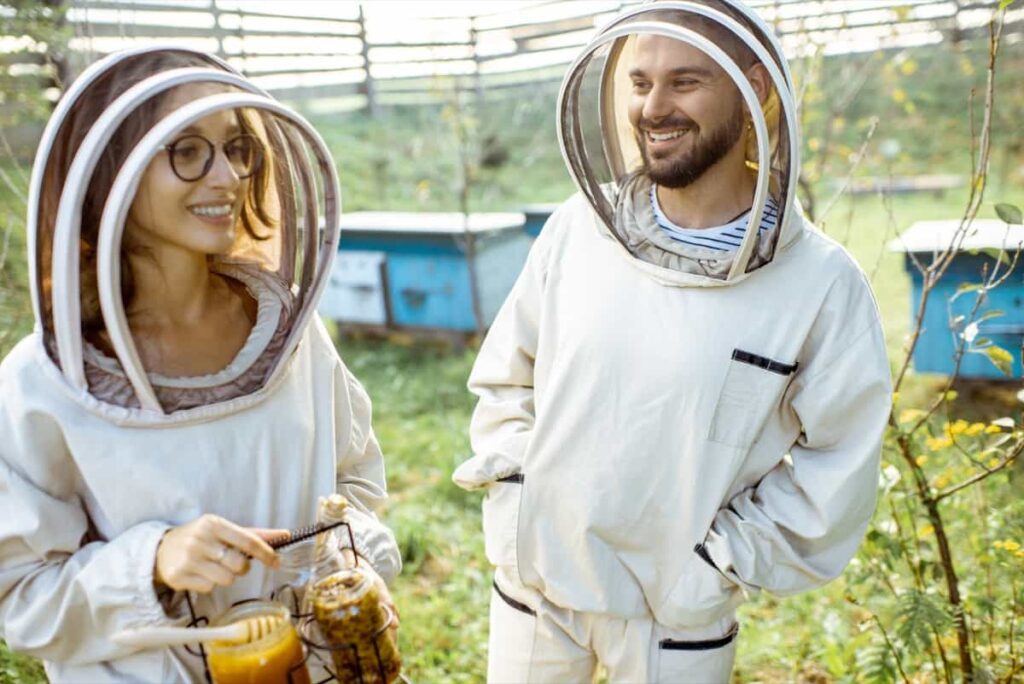
How to Start Beekeeping in Pennsylvania (PA): Regulations, Licenses, and Permits
Pennsylvania’s beekeeping laws require obtaining a beekeeping license and required permits for those interested in beekeeping in the United States within its borders. The Pennsylvania Department of Agriculture manages these regulations, ensuring that bee species in the state are maintained and protected.
How to Start Beekeeping in Rhode Island (RI): Licenses, Permits, and Regulations
In Rhode Island, beekeeping in the United States requires a beekeeping license and necessary permits, such as hive registration from the Rhode Island Department of Environmental Management. These regulations ensure that beekeeping practices in the state align with established standards to support the health and diversity of various bee species.
How to Start Beekeeping in South Carolina (SC): Laws, Permits, and Regulations
South Carolina mandates a comprehensive beekeeping license and associated permits for individuals engaged in beekeeping in the United States. These permits, overseen by the South Carolina Department of Agriculture, ensure adherence to state beekeeping laws, safeguarding the different types of bees in South Carolina.
How to Start Beekeeping in South Dakota (SD): Licenses, Permits, and Regulations
For those practicing beekeeping in the United States in South Dakota, acquiring a license and requisite permits, such as apiary registration from the South Dakota Department of Agriculture and Natural Resources, is essential. These regulations promote responsible beekeeping practices that foster the health of diverse bee species.
How to Start Beekeeping in Tennessee (TN): Regulations, Licenses, and Permits
Tennessee requires a beekeeping license and essential permits for those involved in beekeeping in the United States within the state. The Tennessee Department of Agriculture administers these permits and licenses, ensuring compliance with beekeeping regulations to protect and sustain various bee species.
How to Start Beekeeping in Texas (TX): Licenses, Permits, and Regulations
Beekeeping in the United States within Texas necessitates obtaining a license and necessary permits, such as apiary inspection from the Texas Apiary Inspection Service. Adherence to these regulations ensures that the beekeeping practices align with state guidelines, supporting the health and well-being of different bee species.
How to Start Beekeeping in Utah (UT): Laws, Permits, and Regulations
In Utah, individuals engaging in beekeeping in the United States must secure a beekeeping license and required permits such as hive registration from the Utah Department of Agriculture and Food. These regulations, grounded in state laws, guide beekeeping activities, ensuring the sustainability of various bee species.
How to Start Beekeeping in Vermont (VT): Licenses, Permits, and Regulations
Vermont’s beekeeping rules necessitate obtaining a license and associated permits for those interested in beekeeping in the United States. The Vermont Agency of Agriculture, Food & Markets oversees these permits, fostering responsible beekeeping practices that support various bee species.
How to Start Beekeeping in Virginia (VA): Regulations, Licenses, and Permits
Virginia requires a beekeeping license and essential permits such as apiary registration for those practicing beekeeping in the United States. Administered by the Virginia Department of Agriculture and Consumer Services, these regulations ensure the state’s conservation and health of diverse bee species.
In case you missed it: USA Vegetable Planting Calendar: Month-wise Guide, Schedule, and Chart for All Zones
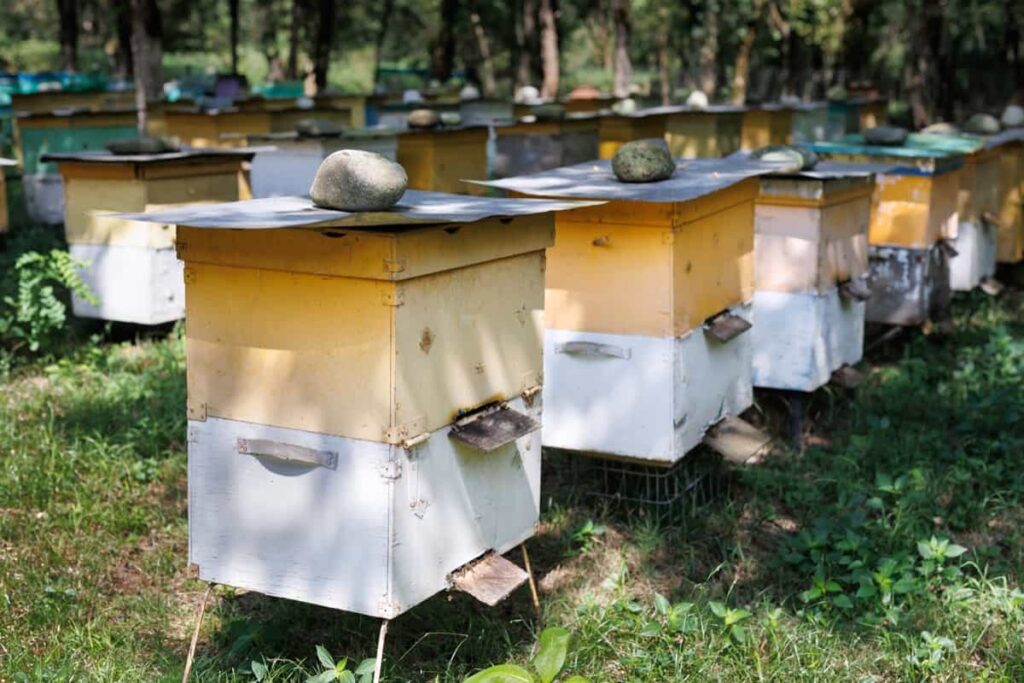
How to Start Beekeeping in Washington (WA): Licenses, Permits, and Regulations
Washington State mandates a beekeeping license and necessary permits for those involved in beekeeping in the United States within its boundaries. The Washington State Department of Agriculture oversees these regulations, ensuring sustainable beekeeping practices and the well-being of different bee species.
How to Start Beekeeping in West Virginia (WV): Laws, Permits, and Regulations
West Virginia’s approach to beekeeping in the United States requires obtaining a license and associated permits from the West Virginia Department of Agriculture. These regulations ensure that beekeeping practices align with state laws, facilitating the state’s health and diversity of bee species.
How to Start Beekeeping in Wisconsin (WI): Licenses, Permits, and Regulations
Wisconsin requires those engaged in the United States to obtain a beekeeping license and necessary permits from the Wisconsin Department of Agriculture, Trade, and Consumer Protection. These regulations ensure that beekeeping practices in Wisconsin adhere to established standards, safeguarding various bee species.
How to Start Beekeeping in Wyoming (WY): Regulations, Licenses, and Permits
For beekeeping in the United States in Wyoming, securing a license and relevant permits, such as hive registration from the Wyoming Department of Agriculture, is essential. These regulations guide beekeepers in maintaining the state’s health and sustainability of diverse bee species.
Conclusion
beekeeping in the United States emerges as a multifaceted practice engrained in the agricultural and economic fabric of the country. Its intrinsic value is displayed through its contribution to biodiversity, pollination, and the production of bee-related products like honey and beeswax.
The nuanced approach required for beekeeping encapsulates various aspects such as state-specific licensing, permits, and regulations, which are instrumental in governing beekeeping practices, ensuring that they are aligned with the sustainability and conservation of the various bee species.
- Broccoli Varieties: Choosing the Right Cultivars for Your Farm
- How to Raise Pigs in Your Own Backyard: A Comprehensive Guide
- Budget Friendly Sheep Shed Ideas: Cheap and Low-Cost Tips
- How Much Do Cattle Farmers Make: Revenue Streams in Cattle Farming
- Management Pests and Diseases in Your Cotton Field
- Sheep Farming Business Plan for Beginners
- Aquaponic Farming at Home: A Step-By-Step Guide
- Profitable Village Farming Business Ideas in 2024
- High-Yield Aquaculture: Fast-Growing Fish for Farming
- Effective Fish Pond Construction Techniques for Beginners
- Irrigation and Water Management in Pineapple Farming
- Blossom to Harvest: Mastering Flowering and Pollination in Papaya Farming
- Pig Fattening Essentials: From Selection to Sale for Beginners
- Raising Wagyu Cattle: A Complete Guide for Premium Beef Production
- Soil Types and Their Water Holding Capacity
- Optimizing Irrigation Schedules for Coconut Groves for Enhanced Yield
- Espresso Your Garden: Coffee Grounds for Healthier Acid-Loving Plants
- The Best Soil Mix for Snake Plants: How to Mix Your Own Snake Plant Soil
- Green Thumb Success: Expert Tips for Cultivating Greenhouse Beans All Year Round
- Bloom All Year Round: The Ultimate Guide to Indoor Hyacinth Care
- Eco-Friendly Gardening: How to Make Liquid Fertilizer from Kitchen Waste
- Ultimate Guide to Grow Anise in Pots: Explore Seed Propagation to Harvesting
- Guide to Raising Chester White Pigs: Discover Breed Facts to Growth Management
- Mastering the Elegance: The Ultimate Guide to Weeping Cherry Tree Care, Planting, and Maintenance
- Ultimate Guide to Planting Garlic in Grow Bags: Growing Strategies for Beginners
- How to Fix Spider Plant Leaf-Related Problems: Natural and Organic Remedies
- 10 Reasons Why Your Tulsi Plant is Shedding Leaves: Home Remedies and Solutions
- Optimizing Growth and Yield: The Advantages of Palm Bunch Ash Fertilizer
- Utilizing Neem Oil Extract as a Natural Pesticide for Hydrangea
- From Soil to Harvest: Various Ways in Which Farmers Can Use AI Tools
- Steps to Encourage and Induce Citrus Flowers: A Comprehensive Guide
- How to Fix Snake Plant Leaf-Related Issues: Natural and Organic Remedies
- Transform Your Garden into a Fragrant Oasis with Raat Ki Rani (Night Blooming Jasmine)
- Discover the Ideal Chicken Breeds for Philippine Farms
- How to Create a Poultry Egg Farm Business Plan for Profits
- Grow Lemon Cucumbers Like a Pro: Insider Techniques for Bountiful Yields
